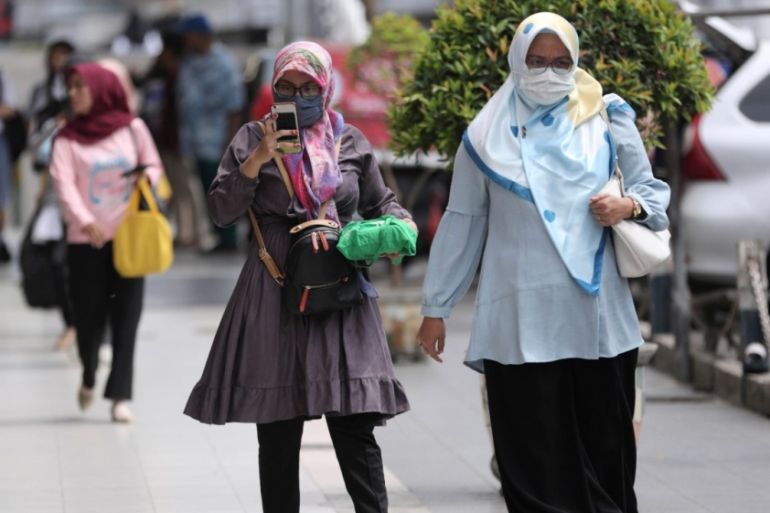Digital doctors: Indonesia uses ‘telehealth’ to fight coronavirus
Doctors in Indonesia are diagnosing and treating patients remotely, using online healthcare systems.

As coronavirus cases surge in Indonesia, doctors are working double-time, treating patients both at hospitals and online through healthtech startups – an approach that is quickly becoming part of the national healthcare system.
Doctor Mohammad Risandi Priatama, 26, has treated 10 people with COVID-19 symptoms over the past month at a busy West Java hospital in a designated virus “red zone” – and provided consultation for dozens more through the app Alodokter.
Keep reading
list of 2 itemsIndonesia reports Southeast Asia’s highest coronavirus fatalities
“Because there are limited healthcare facilities, especially in my district, our people need more information that is easy to use without the need to go to the hospital,” he told Reuters.
With a lack of medical staff and protective gear, and under 4,000 hospital beds for seriously ill COVID-19 patients in an archipelago of 270 million people, authorities have little capacity to manage what some experts believe is an epidemic that has been hidden so far by limited testing.
To lessen the strain, the government is directing the public to so-called telehealth firms through which they can access verified medical guidance, get free doctor consultations via video, telephone or text, and even have medication prescribed and delivered.
Indonesia’s largest telehealth firms, including Alodokter, Halodoc and GrabHealth – a joint venture between Singapore ride-hailer Grab and Ping An Good Doctor from China’s Ping An Healthcare and Technology Co Ltd – have seen usage skyrocket over the past month.
“As hospitals are already packed, the government wants to ensure only priority patients are going to emergency rooms and that patients who don’t urgently need hospitalisation can be helped online,” said Alodokter Chief Executive Nathanael Faibis.
Alodokter clocked 32 million website visitors in March and over 500,000 free coronavirus consultations since Indonesia’s first confirmed case on March 2, Faibis said. Grabhealth said daily consultations had nearly doubled to 10,000.
Indonesia has recorded 3,293 cases of COVID-19, the illness caused by the novel coronavirus. Its death toll of 280 is Asia’s highest outside China, where the virus was first reported at the end of last year.
Government demand
The outbreak has prompted a surge in demand for telehealth worldwide. In China, millions flocked to platforms such as those offered by Ping An Good Doctor and Alibaba Health Information Technology Ltd.
US and European firms have reported similar spikes, with US leader Teladoc Health Inc seeing twice the usual demand, with as many as 100,000 remote consultations weekly.
But Indonesia stands out with the degree to which the government itself is leaning on healthtech firms. Its virus taskforce on March 27 said it would add links on its website to 20 telehealth services and create a “digital call centre” to direct traffic.
Officials said they want COVID-19 patients with only mild symptoms to be treated through telehealth, with doctors referring those whose condition worsens to hospitals.
“This is really good for patients who are self-isolating, in that they can continue communication and receive direction through these startups,” Minister of Health Terawan Agus Putranto told Parliament last week.
The taskforce, healthtech firms and doctors have agreed to share aggregate patient data to aid efforts aimed at slowing the spread of the virus, and are discussing what other information can be shared.
In the province of West Java, where infections have reached 365 with 35 deaths, the local authority has set up its own telehealth service for its 49 million residents through which people can book COVID-19 tests.
“The app asks comprehensive questions to make sure people don’t go to hospitals for the smallest symptoms,” West Java Governor Ridwan Kamil said. Some people are even afraid to visit hospitals believing they are teeming with the virus, he added.
Overall, health experts said telehealth is a partial solution to cope with the surge in patients though the quality of online consultation and security of medical data must be considered.
“Telehealth provides a place for people to ask questions,” said Jakarta-based hospital doctor Shela Putri Sundawa. “But meeting patients directly is very different than talking to them on the phone. How far can a doctor’s responsibility go?”
Virtual treatment
One Jakarta coronavirus patient told Reuters she had turned to Halodoc when she found it difficult to get care after a CT scan revealed white patches in her lungs.
“I went home because the hospital was overloaded with people,” said the woman, who declined to be identified due to stigma surrounding coronavirus patients. “I got an appointment with a doctor on Halodoc and received the prescribed medicine” – the antibiotic azithromycin and malaria drug hyloquin.
Halodoc, which before the outbreak said it had 12 million monthly users, offers medicine delivery through partnerships with pharmacies, laboratories and ride-hailer Gojek. With Gojek, it is also offering free drive-through rapid COVID-19 testing to Jakarta residents, as based on referrals from teleconsultations.
Chief Executive Jonathan Sudharta told Reuters he knew of six COVID-19 patients with mild symptoms who were undergoing their entire coronavirus treatment through Halodoc.
Interest in the service from neighbouring Philippines led Halodoc to launch a localised coronavirus information website for the country, Sudharta said. Alodokter’s Faibis said his firm had received requests to offer consultations in Thailand.
“Perhaps telehealth can be a solution in regions lacking doctors,” said Doctor Sundawa. “But don’t exclude those in areas lacking the internet.”